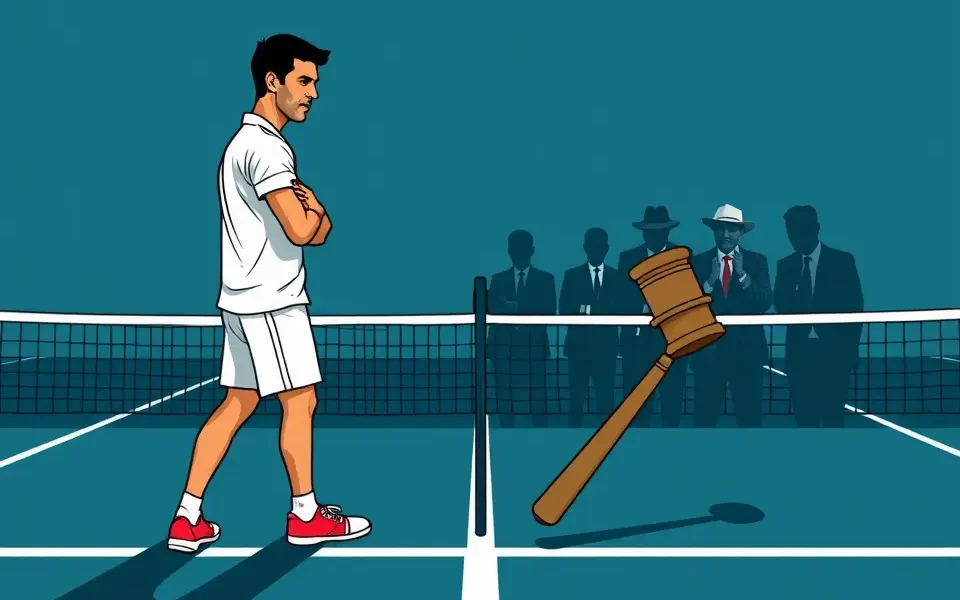Novak Djokovic’s Professional Tennis Players Association (PTPA) has launched a significant legal challenge against the major governing bodies of tennis, alleging anti-competitive practices and a disregard for player welfare. The lawsuit, filed in multiple jurisdictions, accuses the ATP, WTA, ITF, and ITIA of operating as a “cartel” that exploits players, suppresses their earnings, and jeopardizes their health and safety. This action marks a major escalation in the ongoing battle between players and the organizations that control professional tennis.
PTPA Sues Tennis Governing Bodies Over Alleged Anti-Competitive Practices
The Professional Tennis Players Association (PTPA), co-founded by Novak Djokovic and Vasek Pospisil, has officially filed lawsuits against the Association of Tennis Professionals (ATP), Women’s Tennis Association (WTA), International Tennis Federation (ITF), and the International Tennis Integrity Agency (ITIA). The lawsuits, initiated in the United States, the United Kingdom, and the European Union, allege “anti-competitive restraints and abusive practices” that have persisted for decades. The PTPA contends that these organizations function as a “cartel,” implementing “draconian, interlocking anti-competitive restraints” that harm players’ interests.
Key Allegations in the Lawsuit
The PTPA’s lawsuit outlines several key allegations against the governing bodies:
- Collusion and Price Fixing: The lawsuit claims that the ATP, WTA, ITF, and ITIA collude to fix prize money and suppress player earnings, limiting their financial opportunities. Tournament owners allegedly prevent players from requesting prize money increases.
- Unsustainable Schedules: The PTPA argues that players are forced to endure demanding schedules, leading to physical and mental strain. This includes competing in extreme heat, playing matches late into the night, and dealing with frequent changes in tennis ball specifications, all of which contribute to injuries.
- Exploitation of Image Rights: The lawsuit alleges that the governing bodies exploit players’ image rights and impose unfair sponsorship limitations, restricting their ability to capitalize on their personal brands.
- Invasive Practices: The PTPA claims that players are subjected to invasive searches of personal devices, random drug tests conducted at inconvenient hours, and interrogations without legal representation, violating their privacy rights.
- Draconian Ranking System: The PTPA challenges the existing ranking system, arguing that it forces players to compete in specific tournaments and limits their autonomy.
- Lack of Revenue Sharing: The lawsuit points out that tennis players receive a lower percentage of revenue compared to athletes in other major professional sports.
Ahmad Nassar’s Perspective on the Lawsuit
Ahmad Nassar, the Executive Director of the PTPA, has been vocal about the reasons behind the legal action. He asserts that “Tennis is broken,” stating that the glamorous image of the sport hides an unfair system that exploits players’ talent, suppresses their earnings, and jeopardizes their health and safety. Nassar emphasizes that the PTPA exhausted all options for reform through dialogue before resorting to legal action.
Players Voice Concerns Over ‘Systemic Abuse’ and Lack of Welfare
The PTPA’s lawsuit highlights a deep-seated frustration among players regarding the current state of professional tennis. Players argue that their welfare is often disregarded, citing issues such as demanding schedules, inconsistent playing conditions, and a lack of control over their careers and brands.
Ons Jabeur Calls for Structural Improvements
Ons Jabeur, a member of the PTPA’s executive committee and a three-time Grand Slam finalist, has publicly expressed her concerns about the sport’s structure. She believes that improvements are needed in scheduling, match times, and the overall health and safety of players. Jabeur also advocates for better compensation for players, stating that “players deserve to be paid better.”
Vasek Pospisil’s Early Career Struggles
Vasek Pospisil, co-founder of the PTPA, has shared his personal experiences to illustrate the challenges faced by many players. He recounted instances early in his career where he had to sleep in his car while traveling to matches, a situation he considers unacceptable for professional athletes. Pospisil argues that no other major sport treats its athletes in this way, emphasizing the need for change in tennis.
ATP and WTA Respond to the Lawsuit
The ATP and WTA have responded to the PTPA’s lawsuit by vowing to defend themselves against the claims. Both organizations have issued statements rejecting the premise of the PTPA’s allegations.
ATP Accuses PTPA of Misinformation
The ATP has accused the PTPA of “choosing division and distraction through misinformation over progress.” The organization maintains that it remains committed to working in the best interests of the game, promoting continued growth, financial stability, and a positive future for players, tournaments, and fans. The ATP also suggests that the PTPA has struggled to establish a meaningful role in tennis since its inception in 2020.
WTA Defends its Record and Calls Lawsuit Baseless
The WTA has defended its record of growing women’s tennis and describes the PTPA’s lawsuit as “baseless.” The organization highlights its commitment to increasing player compensation and expresses its disappointment with the PTPA’s decision to pursue legal action.
The Potential Impact of the Lawsuit on Professional Tennis
The PTPA’s lawsuit has the potential to significantly impact the structure and operation of professional tennis. If successful, the legal actions could lead to major changes in how the sport is governed, how players are compensated, and how their rights and welfare are protected.
Potential Outcomes of the Lawsuit
- Increased Player Earnings: The lawsuit seeks to increase player earnings by challenging prize money caps and advocating for a greater share of revenue.
- Improved Working Conditions: The PTPA aims to improve working conditions for players by addressing issues such as demanding schedules, extreme playing conditions, and inconsistent tennis ball specifications.
- Greater Player Autonomy: The lawsuit seeks to give players more control over their careers and brands by challenging restrictions on image rights and sponsorships.
- Enhanced Player Rights: The PTPA aims to protect players’ rights by challenging invasive practices such as unwarranted searches and drug tests.
- Restructuring of Governing Bodies: The lawsuit could lead to a restructuring of the governing bodies of tennis, promoting greater transparency, accountability, and player representation.
Expert Opinions on the Lawsuit
Jim Quinn, a lawyer working with the PTPA, believes that the lawsuit will inject competition into professional tennis and lead to a fairer system for players and fans. He suggests that a restructuring of the sport’s governing bodies is necessary to achieve this goal.
Key Figures in the PTPA’s Legal Action
Several key figures are involved in the PTPA’s legal action against the governing bodies of tennis. These individuals include:
- Novak Djokovic: Co-founder of the PTPA and a leading voice for player rights.
- Vasek Pospisil: Co-founder of the PTPA and a vocal advocate for change in tennis.
- Ahmad Nassar: Executive Director of the PTPA, responsible for leading the organization’s efforts to reform professional tennis.
- Nick Kyrgios: A prominent tennis player who has publicly supported the PTPA’s legal action.
The Future of Professional Tennis
The PTPA’s lawsuit represents a critical moment in the history of professional tennis. The outcome of these legal actions will likely shape the future of the sport, determining the balance of power between players and the organizations that govern them. As the legal proceedings unfold, the tennis world will be watching closely to see whether these challenges will lead to a more equitable and sustainable future for all players.








No Comment! Be the first one.